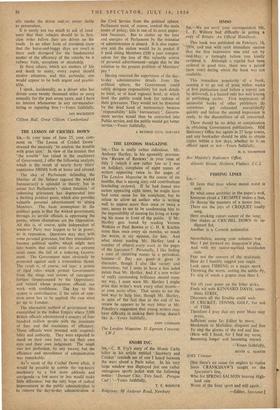SIR,—In your issue of June 25, your com- ment on
' The Lesson of Crichel Down' stressed the necessity to analyse the trouble with great care.' In view of the interest that 'the trouble' has raised in the machinery of Government, I offer the following analysis, which is the result of nearly forty years' experience OHMS both at home and abroad.
The idea of Parliament defending the liberties of the Subject (against the wicked bureaucracy) is splendid in theory; but in actual fact Parliament's ' oldest function' of redressing grievances has degenerated into a thrilling political game, which also provides valuable personal advertisement to sitting Members. The basic assumption' in the political game is that the wicked government, through its servile officials is oppressing the public, whose champions are the Opposition. All this is, of course, quite independent of whatever Party may happen to be in power, or in opposition. Questions may start with some personal grievance, but they immediately become , political squibs, which might turn into bombs that could even (in an extreme case) cause the fall of a tottering Govern- ment. The Government must obviously be protected against such a tremendous threat. The result is. of course, red tape; a system of rigid rules which protect Governments from the slings and arrows of outrageous fortune (impersonated by the Opposition); and behind whose protection officials can work with confidence. The key to this system is centralisation; if the salve of com- mon sense has to be applied, the case must go up to London.
The alternative method of government was exemplified in the Indian Empire where 3,000 British officials administered a country of four hundred million people with the minimum of fuss and the maximum of efficiency. Those officials were invested with responsi- bility and authority. They were expected to stand on their own feet; to use their own eyes and their own judgement. The result was not perfection, by any means; but the efficiency and smoothness of administration was remarkable.
As ta result of the Crichel Down affair, it would be possible to cobble the top-heavy machinery by a few more addenda and corrigenda—a few more or less would make little difference; but the only hope of radical improvement in the public administration is to remove the day-to-day administration of
the Civil Service from the political sphere. Parliament must, of course, control the main issues of policy; this is one of its most impor- tant functions. But to clutter up the time and energies of Parliament by the minutiae of administration is absurd. It is also expen- sive and the nation would be in pocket if it paid sitting Members £500 a year compen- sation for the loss of this valuable source of personal advertisement—might this be the solution to the present problem of Members' pay 7 Having removed the supervision of the day- to-day administrative details from the political sphere, the Government could safely delegate responsibility for such details to local, or at least regional level; at which level the public could look for redress of their grievances. They would not be thwarted by the' dead hand of bureaucracy because 'responsibility' kills ' bureaucracy '. Govern- ment service would then be converted into Public service, and the public would get better service.—Yours faithfully,
A RETIRED CIVIL SERVANT


































 Previous page
Previous page